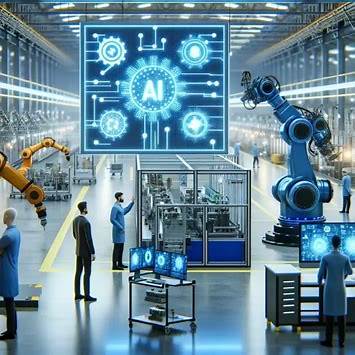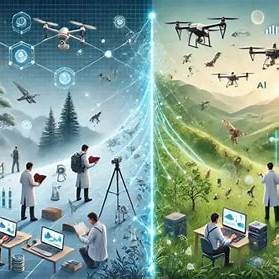🤖 AI for Specific Industries
Artificial Intelligence (AI) is transforming industries by enabling new capabilities, improving efficiency, and unlocking insights tailored to sector-specific challenges.
However, most self-learning AI resources remain generic, leaving a major gap for those seeking real-world, niche applications.
AI for Specific Industries offers a crucial path forward by closing the divide between general knowledge and actionable expertise.
Without access to industry-aligned education, self-learners and professionals may fall behind in understanding how to leverage AI to solve complex problems in their fields.
❓ Why Generic AI Resources Leave Learners Underserved

Most AI learning materials focus on foundational concepts and general-purpose tools. These resources are helpful at the introductory level, but they rarely address the advanced needs of learners trying to enter or grow within a particular profession. Specialized sectors such as personalized medicine, industrial automation, or environmental protection require highly contextual applications of AI that are absent in generic curricula.
A self-learner diving into AI may spend weeks mastering neural networks or natural language processing but remain unprepared to integrate those tools into a healthcare database, climate model, or production line. This disconnect frustrates learners and discourages them from applying AI meaningfully in real-world scenarios.
👥 Why This Matters to Key Stakeholders
1. Career Changers and Adult Learners
Many adults are seeking to upskill for roles in fields like digital marketing, project management, or data analysis. Generic resources often leave them misaligned with industry expectations. Without niche-specific learning, learners risk wasting time, losing confidence, or failing to meet real job demands (KDnuggets, 2025). For these learners, access to targeted AI training aligned with real-world applications can make the difference between a successful transition and an abandoned effort.
2. Employers and Industry Partners
Organizations seeking to hire self-taught professionals want assurance that learners have applicable, workflow-specific skills. Without targeted education, employers are burdened with retraining needs and may hesitate to hire non-traditionally trained candidates (Microsoft Learn AI Hub, 2025). Companies want professionals who can step into their operations with enough knowledge to deliver value quickly—not those who still need to learn industry tools and standards.
3. Self-Directed Learners and Independent Professionals
Freelancers, consultants, and startup founders often need sector-specific knowledge to solve unique challenges. Generic AI content doesn’t prepare them for complex applications in areas like finance, health, or education, resulting in poor outcomes or missed opportunities (Spencer, 2025). For independent professionals, being able to apply AI in specialized contexts is essential for standing out and delivering differentiated services.
🌟 AI’s transformative potential is clearest when applied to the unique challenges of specific industries.
🛠️ Strategic Tips
- Attend niche webinars and virtual conferences.
- Follow company and expert blogs to stay informed on emerging use cases.
- Subscribe to newsletters that summarize breakthroughs and trends in industry-specific AI.
- Join cross-disciplinary communities that encourage dialogue between AI developers and domain experts.
- Participate in challenges or hackathons focused on solving real-world industry problems.
These steps will not only keep learners informed but also open opportunities for collaboration and visibility in their chosen field.
⚠️ Why Are Industry-Specific AI Resources Limited?
Most available content doesn’t address:
- Complex, domain-specific data (e.g., sensor or genomic data).
- Legal, regulatory, and ethical frameworks.
- Integration with existing workflows or industry benchmarks (Smith & Chen, 2023).
Generic courses prioritize scale, not specialization. Consequently, learners must often adapt general principles or rely on costly consultants to translate AI techniques into usable strategies.
This barrier is particularly hard on those from non-traditional learning backgrounds or under-resourced communities.
🔍 Spotlight: AI for Specific Industries in Action

The following case examples highlight how AI for Specific Industries creates value when applied with precision:
🌿AI for Specific Industries in Environmental Monitoring
AI supports biodiversity tracking, pollution control, and climate modeling. Machine learning tools help:
🧬 AI for Specific Industries in Personalized Medicine
- Link climate targets with sustainable development goals (SDGs).
- Enable emission reduction and resource optimization.
- Enhance policymaking with data-driven insights (UNEP, 2022).
Practical use cases include satellite-based forest monitoring, predictive wildfire mapping, and water-quality assessments using IoT sensors paired with AI analytics.
🧬 AI for Specific Industries in Personalized Medicine
AI enables individualized therapies by analyzing genomic and clinical data. Applications include:
- Tailoring treatments for diseases like breast cancer.
- Reducing side effects and improving survival rates.
- Providing clinicians with real-time decision-support tools (WHO, 2023).
From diagnostic imaging to medication recommendations, AI in medicine saves lives and resources. But generic AI models are rarely sufficient to meet the safety and compliance requirements of healthcare institutions. Precision training is essential.
🏭 AI in Manufacturing, Finance, and Marketing
- Manufacturing: Automated defect detection boosts quality and reduces costs.
- Finance: AI simplifies data extraction and validation.
- Marketing: AI sharpens audience targeting and lead generation in niche markets (AI Magazine, 2025).
In these sectors, small enhancements in AI strategy can translate to major performance gains. Industry-specific data models, customized dashboards, and automation workflows help organizations get the most out of AI investments.
Despite these advances, most resources remain academic, lacking practical guides for real-world deployment.
This leaves practitioners and learners without clear pathways to implement AI in environmental contexts.
Generic resources are no longer enough.
To fully harness AI’s potential, learners and professionals need targeted, industry-relevant education.
AI for Specific Industries is the bridge between foundational knowledge and impactful innovation across sectors.
🧠 How Self-Learners Can Stay Current

Keeping up with rapid advances in AI across industries requires dedication, structure, and access to credible information. Here’s how learners can stay sharp and relevant:
📚 Recommended Resources for AI for Specific Industries
- Trade Publications: AI Magazine, MIT Tech Review, Harvard Business Review.
- Websites: KDnuggets, Emerj, Inside Big Data, Microsoft Learn AI Hub.
- Podcasts: Lex Fridman Podcast, AI in Business, Data Skeptic.
- Courses: Pluralsight, DataCamp, Microsoft AI Hub, GAIN Academy.
- Communities: Stack Overflow AI, Reddit r/MachineLearning, LinkedIn Groups.
Video: How Is AI Being Used In Different Industries? - BusinessGuide360.com
Video: Sairone by Saiwa: Advanced Agricultural AI Services for Smarter Farming
References
- UNEP. (2022). Harnessing AI for Climate Action. United Nations Environment Programme.
- WHO. (2023). AI in Personalized Medicine: Best Practices and Global Trends. World Health Organization.
- Smith, J., & Chen, R. (2023). Beyond the Basics: Why Industry-Specific AI Matters. AI Journal, 15(4), 212-229.
- KDnuggets. (2025). AI and Data Science Trends by Industry. Retrieved from https://www.kdnuggets.com
- Microsoft Learn AI Hub. (2025). AI Industry Case Studies & Learning Paths. Retrieved from https://learn.microsoft.com
- Spencer, M. (2025). Top AI Publications and Resources for Self-Learners. LinkedIn. Retrieved from https://www.linkedin.com/pulse/resource-top-ai-publications-2025-michael-spencer-zieef
- AI Magazine. (2025). AI in Marketing: Emerging Strategies for Niche Success. Retrieved from https://aimagazine.com